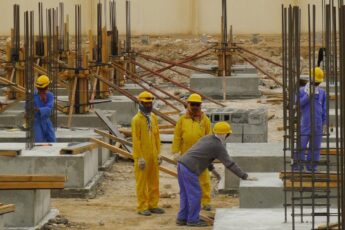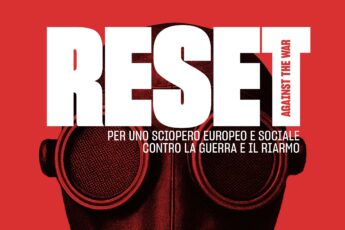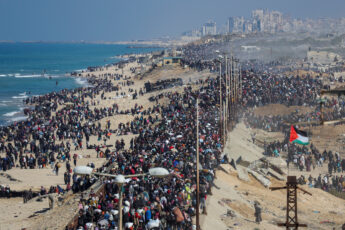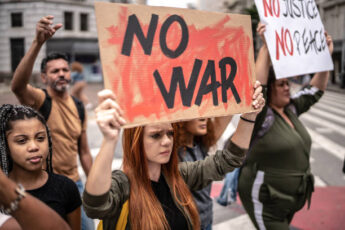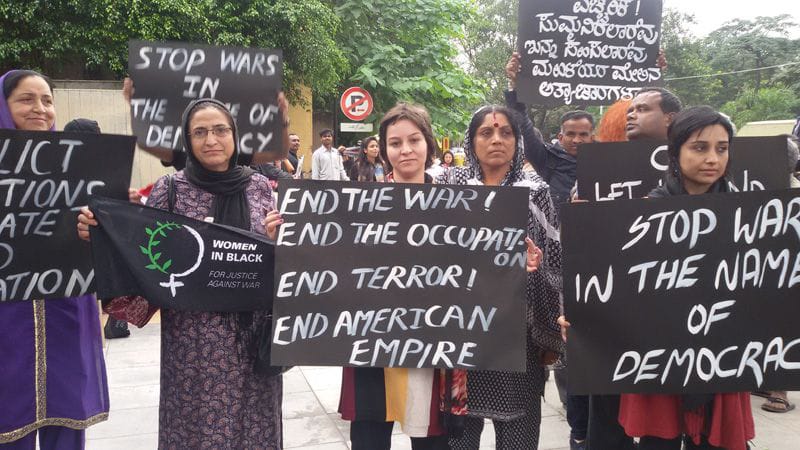
Right after the invasion of Ukraine, the TSS Platform published a statement titled No to War. For a Transnational Politics of Peace, which had a wide circulation. Its diffusion in Europe, from East to West, in the United States and Latin America has led to the creation of the Permanent Assembly Against War, a transnational space for discussion and organization not only to oppose the war, but to practice a politics that takes the side of those affected by the war in Ukraine, those in Russia who oppose the war, and all those who struggle not to be killed, exploited, and oppressed and who will suffer the consequences of the war on their living and working conditions. In order to support and give visibility to this process of organization and communication, we have opened a multi-voiced debate on what expectations the prospect of a transnational politics of peace raises, what its contents can or should be, what the obstacles to its realization are, and the plans for connections and actions that make it possible. The result is a first series of interviews with scholars and comrades who in recent years have contributed to the movement’s debate on issues, discourses and practices that a transnational politics of peace cannot ignore.
After the interviews with Jeremy Brecher (United States), Ida Dominijanni (Italy), and Sasha from Feminist Anti-War Movement (Russia), Ranabir Samaddar (India), we publish the the interview with Cinzia Arruzza – who teaches philosophy at The New School for Social Research in New York – and Tithi Bhattacharya – who teaches South Asian history at Purdue University. Authors, along with Nancy Fraser, of Feminism for the 99%. A Manifesto, published in 2019, Cinzia and Tithi contribute to the debate opened by the Transnational Social Strike Platform on the transnational politics of peace from a feminist perspective committed to thinking about class struggle outside of any orthodoxy. From their words comes an analysis of the war in Ukraine and its effects that shows the articulation between the level of geopolitical relations and that of the social relations of production and reproduction, and that from the experience of the global feminist strike takes up the urgency of a politics of solidarity capable of indicating a universal horizon of liberation starting from the different conditions in which working women, Lgbtq+ people and migrants live on the war fronts and in every part of the world.
***
The transnational politics of peace has the claim to build transnational connections that, while saying no to war, at the same time contest its effects on the living and working conditions of millions of women and men, LGBTQIA+ people, workers, poor, migrants and non-migrants, not only in Ukraine and Russia. Do you think this claim is realistic, or do you think we should prioritize positioning over the reconfiguration of the geopolitical framework?
Cinzia Arruzza: It depends on what one understands by geopolitical framework of analysis. In the past weeks, what has passed as geopolitics very often has made abstraction from an analysis of relations of production and exploitation, focusing on aspects that have to do with mere territorial hegemony. I’ve even heard geopolitical analyses putting forward essentialist views about the “natures” of different nations and peoples. We should stay away from that kind of “analysis”. At the same time, I do not think it is possible to build a transnational politics of peace from below without articulating an analysis of power relations and how they are being modified through the war in Ukraine. This analysis should be grounded in that of the relations of production: what is happening from the viewpoint of the reconfiguration of value chains, of the strengthening of governments’ power to control labor-force in all its diversity, or the redefinition of oppression and exploitation. We need to confront the problem of State power, both on a national and transnational level. The issue is how we do this. In order to have this kind of necessary macroanalysis one needs to adopt an epistemic standpoint that is centered on the oppressed and the exploited.
Tithi Bhattacharya: You’ve posed the question about how we can think about the geopolitical battles between nations in relation to class struggle and how can we privilege the latter. Ever since the war started, I have started re-reading Lenin. He sees struggles against nationalist oppression – in our case, the resistance within Ukraine – as possible staging ground for class struggle. He is a very distinct position from people such as Rosa Luxemburg and Nicolai Bukharin in terms of support of oppressed nations’ right to self-determination, and I want to quote him here, for it also relates to some of the battles Cinzia and I have fought against orthodox Marxists about how to define class struggle: «the socialist revolution may flare up not only through some big strikes, street demonstrations or hunger riots, or military insurrections or colonial revolt, but also as a result of a political crisis such as the Dreyfus’ case, or» – and this is the important part – «in connection of the referendum of the secession of an oppressed nation». Lenin here is following in the footsteps of Marx who was looking to struggles in Ireland, to Black struggles in the US, and to peasant collectives in Russia, to talk about why anti-colonial struggles can sometimes have primacy over conventional ideas of class struggles which people imagine either only at the point of production or in centers of advanced capitalism. I think class struggle and anti-imperialist struggle are integrally connected. In the Russian case this means, as Lenin says, that the working class of the oppressor nation doesn’t just say that they are for international solidarity or peace, for those are, in Lenin’s view, abstract slogans. What the working class of the oppressor nation have to say is that they are specifically for liberation of the oppressed nation. So, in this case the Russian working class, and the anti-war movement, has to commit to absolute independence for Ukraine, not just to an abstract idea of peace. For Ukraine and the rest of us it is to support Ukraine’s right of self-determination, not simply because we believe in nation-States (which in the case of the oppressed nation we do, just as we believe in the right of Palestinian to have their nation State), but because we believe that in an anticolonial struggle there are always possibilities to become a struggle for a higher stage of liberation. The question of imperialism is very important however, not only because of Russia and China’s imperial ambitions, and NATO’s cynical expectations from this conflict to expand its sphere of influence. We are seeing a replay of Great Russian chauvinism and it is not coincidental that the person Putin blames explicitly for giving Ukraine all these fancy ideas of national independence and freedom is Lenin. Our primary opposition to Russian aggression should be fore-fronted, but the question of imperialism and the role of NATO and the US becomes important in two respects: one in terms of historical precedents. If we say that NATO and the US have no role in this, is like saying that the British imperialism has nothing to do with German ambitions in the early part of the 20th century. What we have right now is an attempt to reconfigure post-Cold War power dynamics in the world with new powers such as Putin and Xi Jinping wanting their place in the sun, so to speak. NATO and the US are using this opportunity, over the bodies of Ukranians, to sanitize their own peace-maker credentials. To hear states that killed millions in the Middle East talk about genocides is sheer hypocrisy, but also in practical terms, they could do so much more: for instance to open borders, afford asylum and resources not just to Ukrainian refugees primarily, but also refugees from Yemen etc. This is all in their power to do, and they have absolutely failed to do thereby accelerating the instabilities in this world order.
European states and the US are trying to present themselves as the champions of a democratic internationalism against Putin’s authoritarianism. The violence of the European border regime and neo-liberal capitalism with its devastating effects especially in Central and Eastern Europe seems to be erased. The appeal of Western governments to democratic values, far from indicating a commitment to the enlargement of social or civil rights, is functional to the hardening of opposing war fronts. A transnational politics of peace cannot be exhausted only in the necessary request for the end of hostilities nor in the call for democracy. How can we articulate a discourse that takes into account these contradictions within and beyond the war?
CA: Mere references to democracy run the risk of producing an alignment with the new processes of reconsolidation of the transatlantic pact. On an ideological level this pact is presented, once again, as the alliance of the free Western democratic world which is there to liberate the rest of the world from autocracy. We are seeing this kind of imperial ideology once again being proposed by a large part of liberal media in the United States. Some of the slogans of the propaganda are very similar to what we heard twenty years ago in preparation for the attack on Afghanistan and Iraq, but with a difference: in this case the project is that of a multilateral, multipolar block, centered on the reconfiguration of the transatlantic pact. But some ideological aspects are very similar to what the Republican and a large part of the Democratic parties in the US put forward twenty years ago. And we saw what the outcome of this project of liberation by the champions of democracy was: the devastation of the Middle-East. We cannot just appeal to democracy and we really need to reject any attempt to frame what is happening as yet another clash of civilizations, with some rehearsal of Cold War ideology. In order to build a transnational politics of peace, our task is complete political autonomy from both – uneven – imperialist projects facing each other today. This means, on the one hand, stopping to see Russia as simply the victim of Western imperialism and NATO expansion, and open our eyes to what Putin’s politics have been over the course of years, from the intervention in Syria to the recent intervention in Belarus and Kazakhstan, called by Kazakhstan’s and Belarus autocratic government in order to repress social and working-class struggles. We need to start seeing the imperialist politics of Putin’s Russia, which is a project of limited regional control predicated on the crash of any kind of social and class struggle. I am insisting on this, because we still have in the left what in the US we call tankies, the nostalgic of the Stalinist era who see in Putin a herald of socialism against imperialism. But, beside the tankies, there is a broad tendency to see Putin as a mere victim of NATO’s expansion. The situation is much complicated than this: we need to start talking about Putin’s and the Russian oligarchs’ autonomous project of class and regional domination. On the other hand, we need to reject the new imperialist project of the US and the European Union, which once again present themselves as the liberator of the free world. To maintain the standpoint of class struggle means precisely to maintain the ability of not aligning ourselves to any capitalist projects at stake at the moment, of maintaining a form of radical political autonomy in our analysis and proposals. If we do not do this, the political consequences for the left in the years to come are going to be quite serious.
TB: let’s unpack the question of democracy. Right now, under Biden in America I enjoy certain democratic freedoms that I probably would not enjoy in Modi’s India, my country of origin. Muslims and Dalits are currently openly attacked in India and new laws are being made every day to diminish their rights as citizens. But what is the history of this ‘freedom’ I enjoy in the US? US, Britain and most of western Europe enjoy this democratic stability precisely because of their previous history of imperialist plunder and violence which allowed them to amass massive wealth which in turn allows for a certain level of stability in formal political terms. But advanced capitalism is not about stability. The accumulation drive comes with internal instability, which leads to more imperial extension outside of these so-called democratic borders, as well as constant and escalating expropriation of labor from those inside those borders. So, fascists are not pushing on my door as it happens to some feminist friends in India, but in the US more people are in prison than in India and the prison population of Black people is higher than in the times of slaver. Secondly, to respond to Cinzia’s reference to tankies, a part of the reason why they exist in places like India and Palestine is because if you say to people in the global South like me, that US is a democratic herald, it sounds absurd, because this is the power that has been at the root of our exploitation since the post-war period. One million people were killed in Iraq by this democratic power of which 500.000 were children. Thus, people in these countries believe that my enemy’s enemy must be my friend. The reason why people in the global South think Putin is their friend is because he is fighting western imperialism, and this means for them that he stands with the oppressed and the poor. Our task is to expose that he is standing with the oligarchs. The left needs to be independent in order to put forward this argument, not beholden to either camp. Similarly, we can put our gun on Zelensky’s shoulder as we fire at Putin, but we can never think of Zelensky as our friend. Zelensky has very clearly said in recent times that he wants post-war Ukraine to be like Israel. This is his model. He is no anti-imperialist hero either. Our job, again, is to bring it back to the actual resistance on the ground in Russia and in Ukraine, and to build a genuine anti-war movement. It is not the left’s job to say who supplies arms to whom, the left can do its job by moving the focus from this to the area where we do have some power, which means fighting for opening borders and forcing our own states to welcome refugees.
The war in Ukraine is a patriarchal war because it is reaffirming with bombs all the hierarchies that we contest. At the same time there are racist policies, since at the moment people from Ukraine who are not Ukrainian citizens are not allowed to benefit of the exceptional migration regime enforced for Ukrainian citizens. How do you think a transnational politics of peace can challenge patriarchal and racist hierarchies that the war is strengthening?
CA: I would like to start from the issue of refugees. Of course, there is a differential treatment in terms of Ukrainian refugees and refugees from Ukraine who are not Ukrainian, and there have been criticisms coming from the antiracist left about the different way in which Western countries and Europe in particular seem now to be open to welcome Ukrainian refugees, while same openness was not there for Syrian refugees or for refugees from the African continent. This critique is correct if we look at the discursive level: whiteness plays a role in the way media, for example, are addressing the issue of Ukrainian refugees. There is a danger in this critique, though. For it risks obfuscating the racialization of the Ukrainian working class in Western European countries. Ukrainian workers – I am speaking for instance of the hundreds of thousands of Ukrainian women working as caregivers in Italy – are racialized workers, even though they look white: they are exploited, marginalized, denied citizenship and immigration rights. So, we need to be able to make a distinction between what happens on a discursive and ideological level, and the material reality of the situation. As to the patriarchal war, I agree that the war is basically strengthening patriarchal elements, for example, through the division between male combatants and female victims to be protected. In situations where the conditions were in place, for example in Kurdistan, some very important work has been done to avoid that the war or armed resistance would translate automatically into patriarchal or sexist misogynist mechanism, and this of course was predicated upon the protagonism of Kurdish women combatants within a more encompassing political project, that went beyond military self-defense. The conditions for this in Ukraine are not in place, and this has consequences from the viewpoint of the strengthening of sexist gender roles. The problem is also wider than what is happening on the war front, look for example at what is happening to Ukrainian women’s refugees in countries like Poland. There are hundreds of Ukrainian women who are seeking abortion in Poland, a “democratic” country that has among the most restrictive laws on abortion in Europe, and Polish authorities are obviously denying access to abortion to Ukrainian refugees, including to women who have been raped by Russian soldiers. It is important to emphasize this point also for the sake of challenging once again the myth of the Western free world. “Free” Poland prosecutes activists of abortion rights groups… To sum up, we can identify three striking elements in terms of gender oppression: the re-proposition of gender roles with the women framed once again as the victims rather than autonomous agents, the overexploitation of the Ukrainian women workers and caregivers in Western European countries, and the problem of reproductive rights which are denied to Ukrainian refugees in countries like Poland.
TB: about racialization of Ukrainians, for me it is important to point to the European media who reference the white-ness and Christian-ness of Ukrainian refuges in order to show that they are ‘deserving’. But we also have to point out that this is a war that is allowing NATO to launder its image. I use the word launder advisedly because what is happening is very different from what the states are claiming. On the one hand Ukrainians are welcomed but once in Western Europe, as you pointed out, inserted into the most exploited work-conditions. The question of refugees is being used now to harden border regimes. Look at the UK. Boris Johnson has said that refugees who want to come to Britain will now be send to Rwanda, because UK government has paid Rwanda millions of pounds in order to construct camps there to hold refugees. It is the instability of the war that is allowing capitalist States to pass through policies on immigration and refugees that might have been harder to do in peace time. So again, instead of focusing our attention on who is supplying weapons to whom, we have to focus back to what we can have an effect on, which is immigration and refugeespolicies. To come to the question of women: the war has strengthened and I fear will strengthen further gender binarism within Ukraine, because of universal male conscription. And this means badly not only for women but also for men who refused to fight and for trans women who are being stopped at the border. Think also to what it means for children. Al-Jazeera reported that some teenage boys feel anxiety for not fighting for the nation-State. What does it mean in terms of escalating nationalism within Russia and Ukraine? This is going to have as an effect an escalation of nationalism worldwide, because other powers have to line-up with one side or the other. This is always absolutely devastating most primarily for women, but also for the planet as a whole. We have not yet talked about the ecological impact of this war. The fact that nuclear stations have been turned into sites of imperial competition is deeply worrying and all of this is going to strengthen nationalism and patriarchy worldwide, not only within Ukraine and Russia but globally. We have responsibility as feminist left to draw attention to those contradictions.
The transnational politics of peace must act in the short term, in the face of the urgency of the war, but it must also be able to give itself an autonomous, longer-term perspective. What do you think will be the long-term transformations that this war can produce and what we can do for opposing them?
TB: the long-term concern of the global left right now can be nothing but the planet. There is no socialism without a planet. To make class-struggle environmentalism should be the primary concern of the global left. That does not mean that we subsume the questions of race and gender to the ecological question, but that we see the ecological question has imposing limits to our existence and struggles in the future. And if we think of that as a framing, if we also look at the deep instabilities and inequalities of capitalism that have been exposed by the two years of the pandemic, we only see an escalation of class inequalities, racial and gender violence. To which mix has been added this war and imperial crisis. To get out of this one would think – and it is rational, you do not have to be a Marxist – it is necessary to spend money in social spending, in infrastructure, which would be a way to get out of this deeply unequal situation. However, this war is allowing capitalist States to re-build their arsenal in the way of the pre-Cold War situation. Look at what the Ukrainian war has allowed in countries like Germany (and this was upheld by liberal media), to increase defense spending over the coming years. Sweden, Denmark, Poland, they have all announced that they are going to increase their defense spending. In a situation where we need immediate amelioration of class, gender and racial violence, where we need immediate relief in terms of refugees and health care etc., what we see is that the war is providing the smokescreen for capitalist states to increase these contradictions.
CA: I agree with Tithi on the issue of whom is sending weapon to whom. In calling for NATO countries to send weapons to Ukraine there is some illusion about the effect we can have in the immediate moment. We don’t have the power to influence the imperialist politics at stake right now. On top of this, they don’t really need our encouragement to send weapons, their own imperialist interests suffice. Most importantly, advocating for weapons to Ukraine is going to have detrimental effects on the medium and long term, because by doing so we unavoidably end up aligning ourselves with the US-EU project of re-consolidation and re-configuration of the transatlantic pact. Blinken has already announced that the US intend to reform NATO’s strategic mission, and Finland and Sweden are likely to join. After years of austerity, all of a sudden European states are talking about increasing spending, but in what? Armaments! Aligning ourselves with NATO, even if only for the sake of asking for military assistance to the Ukrainian resistance, would affect our capacity to act in the long period toward rebuilding class struggle in a mutated global situation. Of course, I understand class in a much broader sense than the orthodox view, for example, I include the feminist strike movements of recent years. And of course, the issues of climate change, energetic politics, the reorganization of value chains and of the global financial market are crucial for a new project of class struggle from below. In his recent letter to the stakeholders, Larry Fink – the CEO of BlackRock – stated that access to global financial markets is not a right: we have to rethink the way globalization will work, and globalization does not mean the inclusion of every part of the globe in the financial market, but rather selective inclusion, hierarchies in terms of access to credits, value chains and the distributions of commodities. What will this war mean in terms of the general reconfiguration of global capitalism and what will this entail from the viewpoint of climate change, value chains, migration processes and the transfer of labor force across different countries, the new race to heavy armament and consolidation of transnational military organizations like NATO? But, once again, we need to think about this in the medium-long term, because that’s the term on which we can hope to have an effect. We need to be realistic about what we can achieve today and we have to think how we reposition ourselves in relation to the war crisis not just in terms to what is happening now, but in terms of what this will entail for the years to come.
You mentioned the feminist strike movement which also inspired the writing of your Feminism for the 99% Manifesto. What do you think can be drawn from the experience of this movement in defining a transnational politics of peace?
CA:We can draw two fundamental lessons from feminist strike movement, which would be key to our approach to a transnational mobilization against the war. The first has to do with the feminist strike’s capacity of broadening our understanding of class and class struggle, so as to encompass within it both production and social reproduction, and to account for “unconventional” ways in which class subjectivity expresses and constitutes itself. The second has to do with the feminist movement’s ability to put forward a universalistic horizon without making abstractions from differences – and therefore from specific forms of oppression and exploitation and the subjectivities formed around them. In other words, the feminist strike movement was able to indicate a horizon of universal liberation by grounding itself in the specific oppression of women and LGBTIQ+ people. As I said earlier we need to adopt a class epistemic standpoint if we want to oppose this war without aligning ourselves with either imperialistic project. I think the feminist strike movement showed us what this standpoint should look like in the 21st century.
TB:The feminist strike as a movement reconstituted the political meaning of and necessity for solidarity. In a period where we are often forced to defend “our own”, the international horizon of the strikes reintroduced a politics of defending the “other”. This is precisely the political practice we need to implement in our current conjuncture. Over the decades of neoliberalism as states withdrew from their public function to provide for the welfare of their citizens the weakening of collective social provision meant a diminution of solidarity. Shrinking social reproductive provisions of the state meant the available resources were (a) seen as a bounty and privilege and hence (b) to be defended against the “undeserving”. Against this explicitly anti-solidaristic policies of state and capital, feminists, now more than ever, need to rescue a solidarity that is as anti-capitalist as it is openly confrontational with capital. In the current moment of escalating social inequalities and the climate emergency we should realize how deeply imbricated are our fates with that of others. And as wars and pandemics rip through the world, we need to re-animate a politics of recuperative hospitality, where the fate of our most vulnerable is only the vision of our own future.


